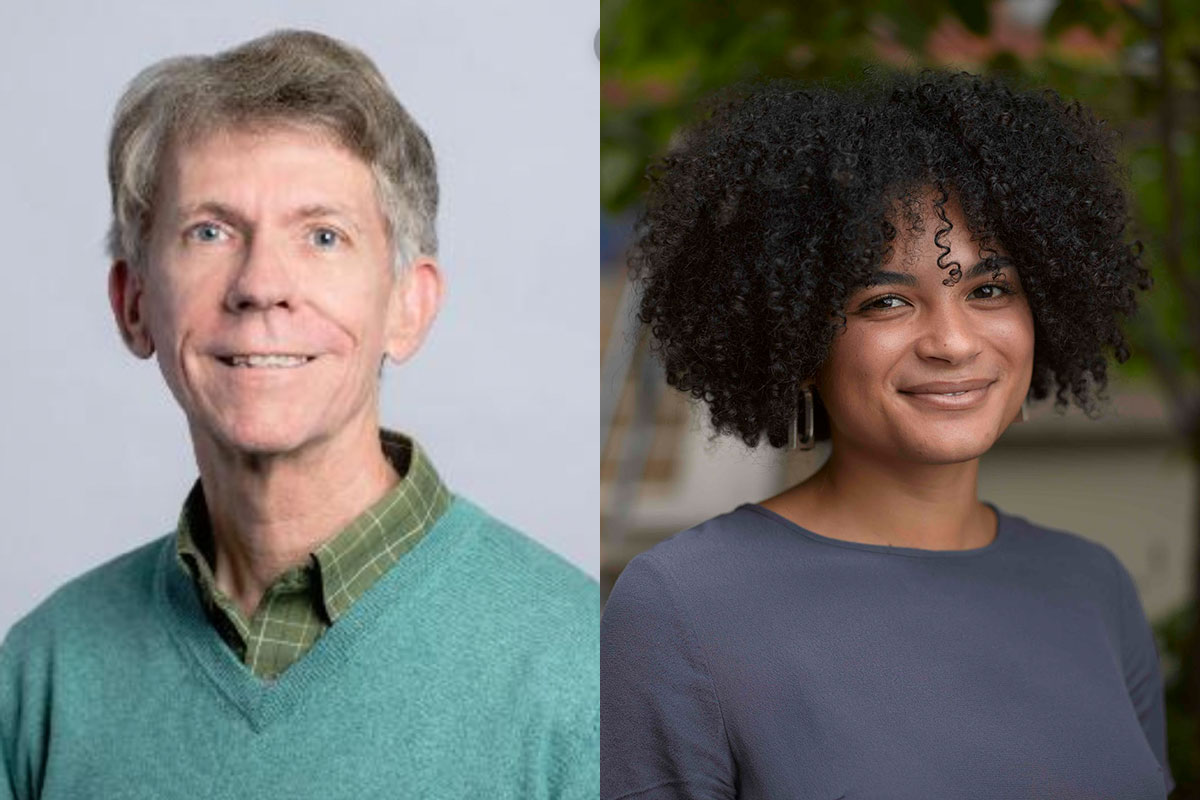Randy McGinnis joined Teachers College’s Peace Corps Fellows Program in 1985, its inaugural year. Dichaba McGinty signed on 33 years later, beginning her studies in May of 2018. Though they represent different eras and perspectives, McGinnis and McGinty exemplify the kind of commitment to students that has kept public school students engaged during the COVID pandemic.
Adapting to the Climate — and Changing It: Randy McGinnis
If there is one lesson that Peace Corps volunteers learn early on, it’s to “roll with it” — meaning, specifically, to be flexible and adapt to local customs and circumstances.
Randy McGinnis, who served in the Peace Corps in Swaziland, put that mindset to good use when he joined TC’s Peace Corps Fellows Program in 1985.
As a science teacher in Northern Manhattan at George Washington High School, McGinnis was having trouble getting his class to settle down. Certain students were the instigators, he quickly deduced — and they were all members of the football team. He went to football practice one day and approached the coach, who looked him up and down and told him that the real reason he wasn’t getting respect was that he was “too skinny.”
“But here’s what I’m going to do for you,” the coach said. He turned and barked out an order for his players to stand in front of him.
“Team, I’d like you to meet our new assistant coach,” he said. “Coach McGinnis’ role is to determine which players are ready to play in each game. So how can you show McGinnis you are ready to play? In your classes, you are now responsible for not only yourselves. It’s on you to settle your classmates down and get them ready to learn. Understood?”
Randy McGinnis wasn't getting his students' respect because he was too skinny, said the football coach. So the coach made McGinnis his assistant. Problem solved.
Problem solved. That year, McGinnis won honors as the New York City rookie teacher of the year, and then-Mayor Ed Koch visited his classroom.
McGinnis went on to become a Professor at the University of Maryland in the Center for Science and Technology in Education. He’s become an expert on climate change and science education — but he may have made his biggest impact, climate-wise, back in those early days in New York. Recently he ran into one of his students from that time who told him about an experience he'd had in the Army. A group of white soldiers were not treating him with dignity. One night, when the soldiers were admiring the full moon, the former student realized that they had no idea why the moon appears to wax and wane over the course of a month. He told them what he’d learned in McGinnis’s class, and from that point on, he had their respect.
— Elaine Perlman, Peace Corps Fellows Program Director
To the Manner Born: Dichaba McGinty
Dichaba McGinty is literally a Peace Corps baby. Her mom was born in the township of Soweto, South Africa, and years later, in Botswana, fell in love with a Peace Corps Volunteer.
When McGinty was seven, the family moved to Syracuse, New York. Today, her mother works to help refugees resettle in that city, and her dad teaches at a local public school. McGinty studied anthropology as well as global health policy at Harvard University and then joined the Peace Corps, serving in one of the most challenging posts, Guatemala.
Born in Soweto, South Africa, Dichaba McGinty is — literally - a Peace Corps baby. Today she empowers her New York City elementary school students to interview high-ranking city officials.
McGinty now teaches fourth grade in both Spanish and English at the Edna Cohen Elementary School, where she works alongside recent Jaffe Fellow alumnus Christina Martin, the school’s curriculum designer.
The arrival of COVID in New York City last spring and the shuttering of city schools was, of course, a major setback for a young teacher launching her career. But McGinty found ways to adapt. For example, she asked her students to create news broadcast videos to report on civic responsibilities, exploring who has the power to become a community advocate and how to gain the ability to make changes. Students ultimately wrote to and met with city officials for interviews. They created videos of their findings as they embodied news reporters.
Chalk another one up for “roll with it.”
